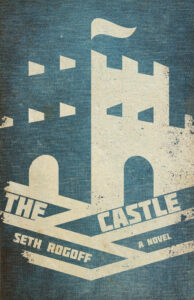The Castle

Description
Seth Rogoff’s masterful and mesmerizing novel, The Castle, draws inspiration from the enigmatic and incomplete final sentence of Franz Kafka’s influential work of the same title.
Follow renowned translator Sy Kirschbaum as he finds his way into the deserted landscape of Kafka’s world where the village of Z. lies eerily silent. The inhabitants vanished like phantoms leaving only remnants of their lives remaining.
From these fragments, Kirschbaum pieces together a vision of a world in crisis triggered by the arrival of a stranger named K. To unravel this mystery, not just for the sake of the vanished village of Z. but for the world beyond, Kirschbaum is compelled to venture where K. could not – the deepest core of the castle.
The Castle is built upon lost documents, forgotten stories, and imagined histories. Unbound by the constraints of an authoritarian and doomed reality, Kirschbaum embarks on an extraordinary journey, seeking meaning through the fertile ground of imagination and embracing the inherent paradox of existence.
Fc2
288 pp.
Publication Date: October 1, 2024
Available through Amazon, Bookshop.org
Blurbs
An intertextual hall of mirrors, a palimpsestic fever dream, an exegetical garden of forking paths, Rogoff’s The Castle doesn’t so much pick up where Kafka’s unfinished manuscript left off as spiral kaleidoscopically in the delirium of interpretation Kafka’s work has unleashed. The overlapping geographies through which this novel’s characters move—fictional, historical, psychic, biblical—are constantly scrambled and reshuffled as if to reveal a secret alliance between cosmic disorientation and playful exuberance
—Ross Benjamin, translator of The Diaries of Franz Kafka
Seth Rogoff’s novel The Castle is one of the most pleasingly confounding books I have read in a long time. It is an exploration of textual memory, an attempt to reconstruct not only what has been lost but also what may never have been, a quest for the ineffable, and a dazzling mystery . The book has a structure that is not ‘boxes-within-boxes’ as much as a labyrinth-within-labyrinths, as the stories within it bend and fold at non-Euclidean angles, echoing and morphing to pile up and twist around each other. The Castle is, clearly, a homage to Kafka, but so much more than that: via Borges, Danilo Kiš, Paulo Maurensig and Diego Maraini, it is a tour of the spectres of the 20th century, and their contemporary resonance.
—C.D. Rose, author of Walter Benjamin Stares at the Sea